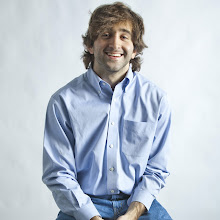The following was originally published on JazzWax.com on February 6, 2012. It was published under the "Eyewitness" Section and is my experience about going to hear Barry Harris recently at the Village Vanguard.
"A week ago yesterday I went to see Barry Harris’s second set at New York’s Village Vanguard. He was appearing with bassist Ray Drummond and drummer Leroy Williams.
Whenever I go to the Vanguard, I like to show up early with hopes of getting a seat just behind the piano’s keyboard. The seat lets me see what the pianist is doing, which gives me quite an education. Fortunately, the table I wanted was open.
Shortly after I took my seat, and I looked around and noticed a “reserved” sign on a table in the center of the club to my right. But as people continued to file into the Vanguard, the table remained empty. I kept watching the door to see who might show up. Saxophonist Lee Konitz walked in, but he didn’t sit at that table.
At 10:55, the lights dimmed. I looked back at the door one last time. There was Tony Bennett standing in the doorway at the bottom of the stairs with a woman, who I later learned was his wife, and a few of their friends. They were waiting to be seated. But instead of sitting at the "reserved" table, Tony chose a booth on the other side of the room. As they made their way to their table, most people in the audience whispered but let him have his privacy.
Then Barry, Ray and Leroy took the stage, and the show began. The trio launched into Like Someone In Love, complete with Barry's signature block-chord style. It was reminiscent of Bud Powell’s version on Dexter Gordon's Our Man In Paris. At the end of the song, Barry said, "Everyone wants to feel like someone in love, but sometimes I just want to be happy."
Naturally, they launched into a brisk, hard-swinging version of I Want To Be Happy. On Harris' version of Embraceable You, his choir joined in. The 20 or so singers were seated like audience members on the "upper-deck" booths just off the stage and were a welcome surprise.
Toward the end of the hour and a half set, Barry picked up the microphone and began to tell a story. He said there was a special person in the audience who had been a close friend of his for years. He told of the first time the two played together, when this person had come by a club where he was playing and sat in. Barry said that each time they would meet—whether in New York or Japan—they would perform the same song.
During one of those chance meetings, Barry said, this person happened to be at the Village Vanguard to hear pianist Tommy Flanagan. Coincidentally, Barry was there, too. When Flanagan invited that person on stage, Flanagan asked what he wanted to do. The person yelled out into the audience, “Barry, what key did we do that song in?” “‘F,’ I yelled back,” Barry said, laughing.
Barry then took a deep breath and said, “I want you to know who is in the audience tonight. Ladies and gentleman, Tony Bennett.”
The place, of course, went nuts. When Bennett stood up to be acknowledged, he spent what seemed like a long moment thinking. Then he started to make his way up to the stage. When Bennett arrived at the mike, Barry yelled out, “Barry, what key is that song in?” They both laughed. However, before we could learn the name of the song they had performed regularly over the years, Bennett humbly said, “I liked what you guys did with Embraceable You. Could we do that one?” Barry launched into an elegant eight-bar introduction, during which Bennett said to the choir, “You’ll have to sing with me.”
Barry was the perfect accompanist for Bennett. The same goes for the choir, which sang long "oo's" behind Bennett and sounded like a string section. It was haunting, in a beautiful way. The choir and Bennett's voice all came in right at the same time and blended perfectly.
Bennett’s voice sounded so good and so strong that it was hard to believe that the 50th anniversary of his release of I Left My Heart In San Francisco was the next day.
As Bennett left the stage, Barry talked about how we had all just witnessed a very special moment. “It’s in the air now,” he said, adding, “I’m sure one of you caught it somehow. It’ll probably come out in Japan and we’ll never know about it.”
Then Barry grew serious again: “New York is a finishing school. You get your beginnings somewhere else, and then you come here. That man is a finisher. Tony Bennett is a national treasure.” Amid the roars, claps and hollers that followed, someone in the audience yelled out, “So are you Barry!” and the applause grew even louder.
As Bennett and his wife and friends made their way up the Vanguard stairs during Harris’ encore, I looked around. Everyone’s expression said the same thing: 'Did that really just happen?'"





